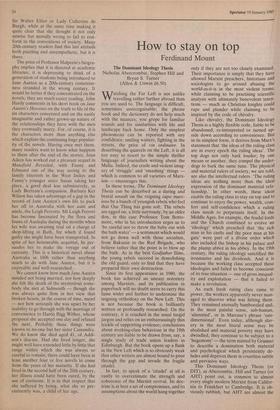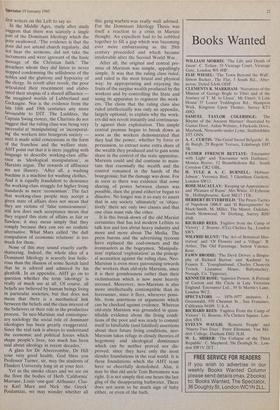How to stay on top .
Ferdinand Mount
The Dominant Ideology Thesis Nicholas Abercrombie, Stephen Hill and Bryan S. Turner (Allen & Unwin £6.50) Watching the Far Left is not unlike travelling rather further abroad than you are used to. The language is difficult, sometimes unrecognisable; the phrase book and the dictionary do not help much with the nuances; you grope for familiar sounds and for similarities with life and landscape back home. Only the simplest phenomena can be reported with any confidence: smiling waiters, fighting in the streets, the price of vin ordinaire. In describing the quarrels on the Left, it is all too easy to resort to the simple thriller language of journalists writing about the Mafia. Indeed, the crude and violent imag- ery of 'struggle' and 'smashing' things which is common to all varieties of Marx- ism — encourages this.
In these terms, The Dominant Ideology Thesis can be described as a daring and brutal assault on the reigning capo marx- ioso by a bunch of youngish rebels who feel that Our Thing has gone soft. The rebels are egged on, a little nervously, by an older don, in this case Professor Tom Botto- more, who in his introduction urges us to 'be careful not to throw the baby out with the bath water' — a sentiment which would not go down well with those socialists, from Bakunin to the Red Brigade, who believe rather that the point is to blow up the bath. As in the best Godfather films, the young rebels succeed in demolishing the old guard, only to find that they have prepared their own destruction.
Since its first appearance in 1980, the book has achieved an uneasy notoriety among Marxists, and its publication in paperback will no doubt serve to carry this fame wider and further to undermine the reigning orthodoxy on the New Left. This is not because the book is brilliantly written or profoundly researched. On the contrary, it is couched in the usual turgid jargon and relies on an embarrassingly thin trickle of supporting evidence; conclusions about working-class behaviour in the 19th century are liable to be drawn from, say, a single study of trade union leaders in Edinburgh. But the book opens up a flank in the New Left which is so obviously weak that other writers are almost bound to pour through the gap and invade the fragile citadel.
In fact, to speak of a 'citadel' at all is vastly to overestimate the strength and coherence of the Marxist revival. Its doc- trine is at best a set of compromises, and its assumptions about the world hang together only if they are not too closely examined. Their importance is simply that they have allowed Marxist preachers, historians and sociologists to go around abusing the world-as-it-is in the most violent terms, while claiming to be practising scientific analysis with ultimately benevolent inten- tions — much as Christian knights could rape and plunder while claiming to be inspired by the code of chivalry.
Like chivalry, the Dominant Ideology Thesis is a highly flexible code, liable to be abandoned, re-interpreted or turned up- side down according to convenience. But in its simplest form, it derives from Marx's statement that 'the ideas of the ruling class are in every epoch the ruling ideas'. The top dogs not only bark louder; by one means or another, they compel the under- dogs to bark the same tune. The physical and material rulers of society, we are told, are also the intellectual rulers. 'The ruling ideas are nothing more than the ideal expression of the dominant material rela- tionship.' In other words, these ideas enable the ruling class to stay on top and to continue to enjoy the power, wealth, com- fort and self-confidence which a ruling class needs to perpetuate itself. In the Middle Ages, for example, the feudal lords and the Church combined to evolve an 'ideology' which preached that 'the rich man in his castle and the poor man at his gate' were part of a divine order which also included the bishop in his palace and the plump abbot in his abbey. In the 19th century, the ruling ideology sanctified the ironmaster and his dividends. And it is because the working class accepted these ideologies and failed to become conscious of its true situation — one of gross inequal- ity and exploitation — that it failed to make a revolution.
As each fresh ruling class came to power, the workers apparently never man- aged to discover what was hitting them. They remained eternally bamboozled and, in the most painful sense, sub-human, 'alienated', or in Marcuse's phrase 'one- dimensional'. Even today, although slav- ery in the most literal sense may be abolished and material poverty may have dwindled, they continue to be subject to a 'hegemony' — the term minted by Gramsci to describe a domination both material and psychological which persistently de- ludes and deprives them in countless subtle and pervasive ways.
This Dominant Ideology Thesis (or DIT), as Abercombie, Hill and Turner (or AHT) point out, is common to almost every single modern Marxist from Califor- nia to Frankfurt to Cambridge. It is ob- viously rubbish, but AHT are almost the first writers on the Left to say so. In the Middle Ages, study after study suggests that there was scarcely a single part of the Dominant Ideology which the poor swallowed. 'The evidence is that the poor did not attend church regularly, did not hear the sermons, did not take the sacraments and were ignorant of the basic message of the Christian faith.' The
preachers whom they did listen to never
stopped condemning the selfishness of the nobles and the gluttony and hypocrisy of the clergy. In revolt after revolt, the poor articulated their resentment and elabo- rated their utopias of a shared affluence - the imagined worlds of Lubberland and Cockaigne. Nor is the evidence from the late 18th and 19th centuries any more favourable to DIT. The Luddites, the Captain Swing rioters, the Chartists do not suggest that the ruling class was being very successful at 'manipulating' or 'incorporat- ing' the workers into bourgeois society until it made solid concessions in the form of the franchise and the welfare state.
AHT point out that it is mere juggling with language to describe working-class afflu- ence as 'ideological manipulation', as Marxists argue. The rewards of affluence are not illusory. 'After all, a washing machine is a machine for washing clothes.'
And it is equally fraudulent to denounce the working-class struggle for higher living
standards as mere 'economism'. The fact that working-class people may accept a given state of affairs does not mean that they are victims of 'false consciousness';
still less does such acceptance mean that they regard this state of affairs as fair or
flawless; it may mean simply that they comply because they can see no realistic alternative. What Marx called 'the dull compulsion of economic relations' is too much for them.
None of this may sound exactly earth- shattering. Indeed, the whole idea of a Dominant Ideology is scarcely less ludic- rous than the illusion of some Scotch laird that he is adored and admired by his glenfolk. In an appendix, AHT go on to
question whether the term 'ideology' is really of much use at all. Of course, all
beliefs are believed by human beings living in particular societies; but that does not mean that there is a mechanical link between the beliefs and the class interest of the believers or their role in the productive process. 'In neo-Marxism and contempor- ary sociology the social role of dominant ideologies has been greatly exaggerated. Since the real task is always to understand the economic and political forces which shape people's lives, too much has been said about ideology in recent decades.'
A glass for Dr Abercrombie, Dr Hill your very good health, God bless you Professor Turner, sir, may the students of Flinders University long sit at your feet.
Yet as the smoke clears and we see on the floor the bodies of Herb 'California' Marcuse, Louis 'one-gun' Althusser, Clas- sy Karl Marx and Nick 'the Greek' Poulantzas, we may wonder whether all this gang warfare was really well advised. For the Dominant Ideology Thesis was itself a reaction to a crisis in Marxist thought. An expedient had to be cobbled together to fill a gap which was becoming ever more embarrassing as the 20th century proceeded and which became intolerable after the Second World War.
After all, the original and central pre- mise of Marxism was simple, appallingly simple. It was that the ruling class 'ruled, and ruled in the most brutal and physical way: by appropriating and enjoying the fruits of the surplus wealth produced by the workers and by. controlling the State and using its apparatus to regiment the work- ers. The claim that the ruling class also ruled intellectually was only an appendix, largely optional, to explain why the work- ers did not revolt instantly and continuous- ly against their exploitation. This simple central premise began to break down as soon as the workers demonstrated that they had the power, whether by force or persuasion, to extract some extra share of the wealth they produced and to gain some share in the control of the state apparatus. Marxists could and did continue to main- tain that essentially the wealth and the control remained in the hands of the bourgeoisie; but the damage was done. For as soon as there was evidence that some sharing of power between classes was possible, then the grand either/or began to dissolve. No longer was it so easy to assert that in any society 'ultimately' or 'objec- tively' there are only two classes and that one class must rule the other.
It is this break-down of the old Marxist certainties that has led modern Leftists to talk less and less about heavy industry and more and more about The Media. The press barons and the advertising tycoons have replaced the coal-owners and the ironmasters as the bogeymen. 'Manipula- tion' replaced 'exploitation' as the princip- al accusation against the ruling class. Neo- Marxism is even more patronising towards the workers than old-style Marxism, since it is their gormlessness rather than their victimisation which is now most heavily stressed. Moreover, neo-Marxism is also more intellectually contemptible than its forerunner, since it flees, wherever possi- ble, from assertions or arguments which can be checked against evidence. Whereas old-style Marxism was grounded in quan- tifiable evidence about the living condi- tions of the poor and was ready to commit itself to falsifiable (and falsified) assertions about their future living conditions, neo- Marxism takes refuge in cloudy theories of hegemony and ideological dominance which can be neither proved nor dis- proved, since they have only the most slender foundations in the real world. It is these foundations which the AHT team have so cheerfully demolished. Alas, it may be that old uncle Tom Bottomore was right. It is not simply that one hears the last glug of the disappearing bathwater. There does not seem to be much sign of baby either, or even of the bath.











































 Previous page
Previous page